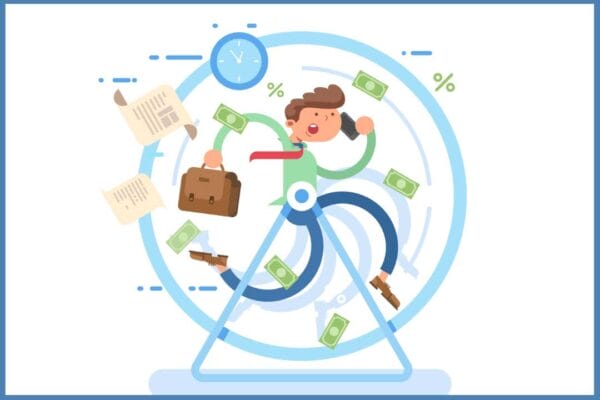Hustle culture: Why hard work alone won’t make you rich
 The toll of hustle culture
The toll of hustle culture
Is the secret to wealth as simple as working harder than everyone else? What does that look like in practice, and is it sustainable?
You’ve probably heard of hustle culture. If you haven’t, you’ve seen it in nauseating social media posts talking about “time to get this bread,” “rise and grind,” “the hustle never sleeps,” etc.
While these eye-roll-inducing TikTok influencers are less popular than they used to be, the enchantment of hustle culture persists: there’s money to be made out there if you’re willing to put it all on the line.
Hustle culture is an ideology that says anyone who works hard enough will be rich. It’s a mindset that glorifies prioritizing your professional goals above everything else, including sleep, mental health, and relationships.
The hustle formula is as follows: If you’re constantly “on,” pushing yourself to the limit—even at the cost of your well-being—success is within reach.
Your imagination alone determines what it means to be successful—hustle culture offers no direction on how to get there—but so long as you’re restless about the amount of work you do, you’re on the right track.
But that’s the problem with hustle culture: it ignores reality.
Why hustle culture fails
People aren’t machines, and no matter how much a boss might want them to be, running people into the ground doesn’t unlock their best work. It just burns them out. There’s no such thing as “enough” in hustle culture.
However late you stay at the office, somebody else will stay later. No matter how early you get started, someone else is starting earlier. Going the extra mile is the bare minimum, and problems emerge.
Hustle culture is an attractive ideology for motivating workers, but science doesn’t support any idea that sacrificing well-being yields better work outcomes. It says the opposite.
Let’s discuss how hustle culture often does more harm than good and ways to motivate employees without destroying their work-life balance.
Defining the hustle
LinkedIn is full of diverse perspectives on work-life balance. Many posts celebrate a strong work ethic and dedication to achieving goals. However, it’s important to remember that everyone’s definition of success differs. Prioritizing rest and well-being is crucial for long-term health and productivity.
Sarcasm, belittlement, and tough love are the hallmarks of hustle culture. Shame is its primary motivator, turning every urge for sleep, food, or companionship into an act of giving up. Think about it: does a Navy SEAL have time to sleep? (Hoo-rah!)
Warriors, war, battle, attrition—all these images paint a desperate picture of survival where if you don’t work your tail off, you will literally die. At the very least, you’ll be forgotten among the ranks of the unremarkable.
This intensity might lead you to make an assumption. You might assume that hustle culture’s most prominent supporters are certain types of people. Perhaps you think they are high-powered lawyers.
The face of hustle culture
Or maybe you can imagine them as titans of mergers and acquisitions. They could be entrepreneurs like Tony Robbins and Gary Vaynerchuk. Alternatively, they might be scrappy startup pioneers.
These pioneers might have nothing but the shirt on their backs and unbelievable grit to keep them going.
This is not the case.
Most people who post and re-post about hustle culture are average individuals. These individuals crave direction and validation. As a result, the hustle culture ideology targets their urge to work long hours.
It does this by making them feel inadequate about working less. In essence, it helps them externalize their shame. It allows them to channel it in “productive” ways.
Are the sleep-deprived, work-obsessed, wealthier, or more successful? No, their grind increasingly looks less like actual work and more like selling their dream of constant work to others.
Hustle culture may seem inevitable, but it represents a paradigm shift in how people approach work, and like all paradigm shifts, there was a time before it.
The rise of the hustle
 Money used to go further. That’s the truth.
Money used to go further. That’s the truth.
Until the 1970s, average working wages paid enough for one parent to support a family. By the 1980s, however, shelling out six figures for a home was the norm.
Only white-collar professions like medicine, law, and business let someone support their spouse in staying home to raise the kids.
The term “stay-at-home mom” wasn’t even a thing until the 1990s, when the share of two working-parent households shot up 15 percent.
Today, that’s all changed. People with kids need both parents to work. It’s the only way to afford the rent, which has more than doubled over the past 20 years.
These are the circumstances from which hustle culture emerged—as a response to working more hours to maintain the same standard of living. It’s understandable how someone could blame poverty on laziness if they weren’t aware of the extended pattern that got us here.
“If working hard made you rich, donkeys would be covered in gold.”
– French proverb
Hustle culture is a cry for help. With enough praise from LinkedIn followers, you can momentarily quiet the suspicion that it may not be enough, no matter how hard you ignore self-care and work.
The allure of the grind
It’s safe to say that professional athletes are held in high regard worldwide. They are irrefutable proof that you can be a champion if you’re willing to work harder than everyone else.
Now back down to Earth. Most of us could use more money. As traditional career paths provide less and less of the income needed to meet the rising cost of living, side hustles have emerged to fill in the gaps, with no limit to how much time you can spend there.
GrubHub, Uber, Instacart—each of these companies hires independent contractors who pick their schedules to make a little money on the side. No long-term commitments.
No boss nagging you to show up on time. Nothing permanent. It’s a work style that perfectly embodies the hustle culture mindset. Want more money? Work harder. Want a better work-life balance? Have fun being poor.
If LeBron James can go pro at age 18, you can forego a night out with your spouse to save for retirement.
This is how hustle culture works, by preying on the parts of life you can temporarily ignore:
- Why not work ’til midnight?
- Do you need to eat with such a significant workload?
- Seriously? TV right now?
Everyone who has pulled an all-nighter knows that while it’s possible, it’s terrible for your health. Staying up all night certainly doesn’t help you be productive the next day.
But how do you know your fatigue isn’t just weakness leaving the body? Hustle culture casually ignores how just because you can do something doesn’t mean you should. It never asks whether chasing wealth tomorrow is worth destroying your physical health today.
And yet, who isn’t inspired by watching Olympic athletes put everything on the line for the gold medal?
The dark side of hustle culture
Hustle culture is unsustainable. Be suspicious of anyone who doesn’t take breaks or frowns on others for valuing their personal life. They need to understand how vital rest is to one’s health.
To illustrate how bizarre and unhealthy these behaviors are, imagine those same questions from earlier being asked to you by a loved one:
- Really babe? You’re going to bed when you could be working ’til midnight?
- I made some food but not for you since you have so much work to do.
- Get off the couch. TV is for losers.
These would all be grounds for abuse, and saying them to yourself is no better, even if it feels more brutal and gritty than heartless.
Whatever momentary upsides you may enjoy, the downsides of extreme working hours are worse:
- Burnout and exhaustion from constant work without adequate rest
- Increased stress and anxiety due to a continuous need to perform
- Strained relationships with loved ones, leading to isolation and loneliness
- Unrealistic expectations of work and achievement
- Loss of enjoyment and passion as overwork diminishes joy and fulfillment
Again, just because you can exceed your limits doesn’t mean you should. There are plenty of healthy ways to do good work that don’t require you to sacrifice your health and well-being.
Alternatives to the grind
The lie of hustle culture is that feeling guilty all the time is the best way to work harder and get results. This is just not true, nor is it effective in the long term.
Being intentional about your life is the most direct and effective path to success. Set goals, take time to understand what you want, practice those things, and celebrate achievements when they happen. Take regular breaks.
You’re more likely to land on a million-dollar idea through patient thought than by panicking about not working hard enough.
Here are some steps to be successful without harming your well-being:
- Set expectations before you start work: To-do lists, Pomodoro timers, and task boards are all great ways to focus on specific projects and milestones without getting overwhelmed. There is work to do today, and you are entitled to a nice, relaxing lunch break.
- Make others feel valued: At the end of the day, we’re all just looking for recognition and praise. Make valuing others a priority, if not daily, at least monthly. Give time to volunteer efforts so you can intentionally spend your focus elsewhere.
- Don’t work when you shouldn’t: Silence emails and work calls after you clock out. Some countries have already passed laws that ban employers from calling you after hours. This is a good thing, but you can get started by simply detaching from work when the time comes.
- Work diligently: Take your time. Slow and steady is better than fast and sporadic.
Many full-time positions offer a mental health day for employees to calm stress levels and recharge. If this isn’t your workplace culture already, consider adopting the practice.
The future of hustle culture
Hustle culture could be doing better right now. Whatever appeal it had faded once people couldn’t get clear answers about where to spend their efforts in achieving wealth. After all, if hard work isn’t smart work, it’s just hard.
Some complaints (from anonymous sources) circulate that Gen Z doesn’t fit well into the existing corporate model. They saw Millennials go to college only to launch into a dying job market. The result? When a boss tells Gen Z to work harder for the same salary, they ask why, and bosses don’t like that.
More of the same Gen Z inquisitiveness is imminent, and that’s good. Managers and HR teams must provide teams with precise, manageable tasks rather than an ambiguous prod to “find something to do.”
The workers of the future will communicate more. They’re disillusioned with the tricks that gave rise to hustle culture.
In short, they know that hard work doesn’t make you rich.
Additional resources:
Imposter syndrome in the workplace: Signs, causes, and solutions ![]()
Gig economy explained: Pros, cons, future outlook ![]()
Workplace etiquette: The ultimate guide to professionalism ![]()
- Editor’s Note: A previous version of this story mistakenly included Adam Neumann among entrepreneurs who’d been accused of criminality. (Neumann has not been accused of any crimes.) Business Management Daily regrets the error.
Want more insights like these? Visit Dallin Nelson’s author page to explore his other articles and expertise in business management.






